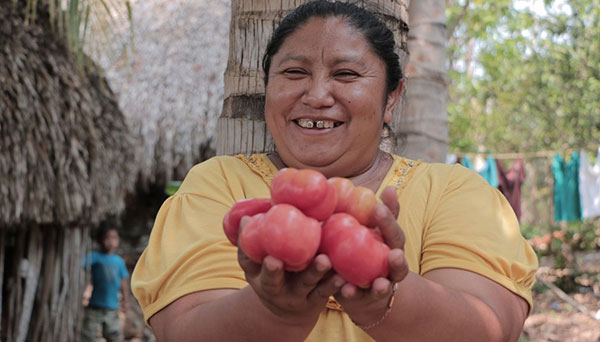Community School for Mayan Regenerative Agriculture and Agroforestry Techniques
Organization: Mixbaal Fondo para el Fomento de la Educación A.C.
The mission of the Mixbaal Education Fund (Mixbaal Fondo para el Fomento de la Educación, A.C.) consists of generating training and job opportunities for women and youth, with a view to encouraging community organizing and food sovereignty processes based on the recovery of local knowledge and regenerative agriculture.
Location: Sotuta, Yucatán
Country: Mexico
Other Organizations Involved: Cultiva Alternativas de Regeneración; Boox Luum Agricultura Regenerativa; Mexican Civil Council for Sustainable Forestry (CCMSS).

©Mixbaal Fondo para el fomento de la educación A.C.
Background
In response to the economic crisis, which the pandemic aggravated, a group of Mayan women from Sotuta, Yucatán, created the Solares Huertas Agroforestales (Agroforestry Gardens) project. Proposing to revive traditional farming on their plots, they obtained the resources needed for subsistence food production. They also formed a cooperative of women producers, which now owns a food processing center for processing and commercializing surplus production. However, to sustain their efforts and scale up production, they must develop an effective agroecological model adapted to their needs. Thus with the Community small farmers’ school for regenerative agriculture and Mayan agroforestry project, new employment and training opportunities will be created for youth, women and men. This will consolidate a system of collective organization that can create local sustainable projects as economic alternatives, which will allow families to cease depending on income earned as migrant laborers.
Goals
- Implement an intergenerational and intercultural educational program on traditional Mayan agriculture, regenerative agriculture and agroforestry.
- Design and implement a replicable agroecological production plan for backyard production of fodder, vegetables, fruit trees, medicinal plants and eggs.
- Organize workshops on specialized agroecological topics, as well as visits by local school groups and an annual regional gathering of farmers to exchange seeds and knowledge during the life of the project.
Main activities
- Train—via classroom and hands-on lessons—youth, women and men in regenerative agriculture techniques and community management.
- Establish a small facility to produce organic biofertilizers and two community plant nurseries to propagate multi-purpose species.
- Prepare, plant, care for and harvest food using agroforestry systems on six plots of land in the community.
- Organize workshops, visits and events.
Outcomes
- Creation of a model for community management and organization in relation to the sustainable use of locally available resources.
- A replicable and standardized plan for the agroecological production of fodder, vegetables, fruit and timber-yielding trees, medicinal plants, mushrooms, and backyard eggs, which is implemented in at least six plots in the community.
- Sustainable undertakings are fostered, which contribute to economic support for local youth, women and men.
- Linkages that enable scaling up agroecological production in the region and facilitate the transition to agroecological production for more farmers.